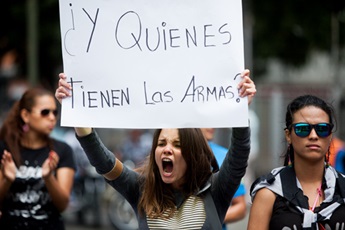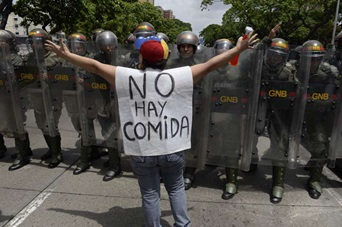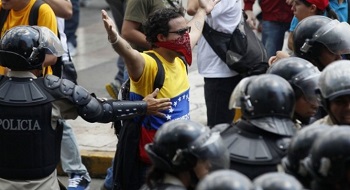Also available in: Español
Source: corresponsalesclave.org
Within the crisis context in the country, all people are abused; every Venezuelan is a potential direct victim of power abuse by the organizations that should protect them. However, there are especially vulnerable groups due to their gender, age and sexual orientation; facing this situation several civil society organizations alert on this difference and provide support spaces.
By: Constanza Armas
The crisis situation in Venezuela is undeniable. For several years we have seen the unprecedented institutional, political, social and economic deterioration in the country, which has generated a significant increase in protests and several signs of discontent with the national government. In this sense, the Venezuelan Observatory of Social Conflicts (OVCS), in its report year 2014, registered between January and December that year at least 9286 protests, equivalent to 26 daily protests all over the country, with high political content and related to social rights. In year 2015, 5851 protests were registered; 82 percent on social rights; likewise, there are records of 287 looting or attempted looting situations. Although these organizations have not reported data from 2016 and 2017, it is known that the situation of protests and conflict in the streets of the main cities of the country still prevails.
In parallel to the records of protests carried out during these years, several human rights organizations have denounced the increase in repression and violence from the Government agencies: for instance, during the protests in the last weeks, there were at least 5 people killed by direct action of the National Bolivarian Guard, as well as hundreds of injured people.
Within this context of institutional weakness and violence, of upsurge of street protests from people tired by scarcity, hunger and misery, in opposition to the government of Nicolas Maduro in the last weeks, we should focus on the differential effects on people based on their gender, age and sexual orientation, that arise both from political polarization and the increase of complaints and brutal repression.
Differential effect of repression by Government security agencies
When there is repression by the Government agencies in front of citizen’s protests, everyone is at risk. However, it should be taken into account that there are groups or populations at a higher risk compared to others. Some of this vulnerability factors are related to gender, age and sexual orientation.
In this sense, Jau Ramírez activism coordinator of the Movimiento SOMOS told Corresponsales Clave that in Merida they are documenting a case on an arbitrary detention at the Sun Fairs. “At the fair parade there was a protest during the event that was repressed by the State Police (Poli Merida). There were several detentions and kidnappings. One of the cases was about five boys that were taken in a police car and supposedly were beaten. The testimony from one of them is that there was a homosexual (…), when the police noticed that he was gay they raged against him and he was beaten harder than the others; afterwards, they let them out of the car at an avenue in the city¨, he said.
In the same line of differential vulnerability, Alejandra Sapene Chapellín child and adolescent psychologist, member of the recent initiative Madres venezolanas por la paz (Venezuelan mothers for peace) and author of the blog el Bosque, where she has been writing since 2014 about the influence of the political crisis on children, says –emphasizing the gender perspective, that “with adolescents, there is greater probability that the security forces detain or attack young boys more than women (…) There have been situations with young women, but they even release them. Obviously there are political women prisoners, that is not under discussion, but in number, the risk seems to be higher for boys. As statistics show in Venezuela: to be a young boy in Venezuela is highly risky and there is a very high probability that you will be killed¨.
These observations are very interesting in the context of a conflict and threat climate from the Venezuelan government agencies, as this help us sharpen our gaze and to raise the voice on behalf of all people, and especially the most vulnerable ones. Ramírez correctly says, particularly on behalf of the LGBTI population: “regarding the crisis, it is evident that being a vulnerable group we are more impacted by the effects of the economic, political and social crisis, first because the lack of guarantees expose us more and secondly because – as we have been told so- we are not a priority¨.
In addition, political polarization
At present in Venezuela, the response from civil society organizations is additionally affected by political polarization. In times like these, where people are out in the streets, facing the Venezuelan crisis, the discourses and disagreements between civil society organizations increase, as a result of the political polarization that has ruled in the country for several years. This has always been a problematic situation for the organizations that work in the human rights area, as the movements get divided and the focus of the complaints is lost as well as the joint work.
In this sense, Ramírez says that “political polarization has dramatically affected the capability of organization within the LGBTI community, which has been segmented by openly Chavista groups that have created separations and have impregnated the struggle with partisan political ideas. . This has promoted bias in other sectors¨.
 In view of this scenario, social organizations take different strategies to continue their work and achieve their political objectives in defense of human rights. Regarding this, Giovanni Piermattei, president of Venezuela Igualitaria, says that his organization “tries to stay on the sidelines, focusing on the specific action of equal rights for the LGBTI population, because in this climate, regardless the position that we take we are attacked: if we speak of peace and dialogue, we are ¨chavistas¨, and if we speak about repression and lack of congruence of the government, we are opposition¨.
In view of this scenario, social organizations take different strategies to continue their work and achieve their political objectives in defense of human rights. Regarding this, Giovanni Piermattei, president of Venezuela Igualitaria, says that his organization “tries to stay on the sidelines, focusing on the specific action of equal rights for the LGBTI population, because in this climate, regardless the position that we take we are attacked: if we speak of peace and dialogue, we are ¨chavistas¨, and if we speak about repression and lack of congruence of the government, we are opposition¨.
Keeping our eyes on the objectives gives us some clarity to keep the focus on the political responsibilities that each organization represents, in front of a reality that seems to be a minefield. Thus, civil society remains on the ground and looks to the future through the sustained work that it is performing and the reflections derived thereof.
An example of this last point is shown in the work of Sapene on the effects of political violence on boys and girls, where it is “showing the issue of citizenship, the importance of educating democratic individuals. We have the responsibility to show them that the reality is not normal, that what is happening are situations of political violence, we can talk to adolescents with crystal clear words, and we can tell the little ones that some people are not fulfilling their role, some people that should be protecting us are not doing so (…) We have to make children ask themselves: what do you think about what is happening? Do you think this should be this way? Shouldn´t it be like this?, how should things be? Look how things are in other countries. Just to encourage that critical view¨.
This perspective is very interesting as it invites us not only to care for vulnerable populations and make them visible within a complex climate of repression and conflict, but also to empower them, from a critical look at reality, asking ourselves some questions. As Sapene says “This may contribute to educate people with a more inclusive view of diversity and to strengthen democracy. I hope that this will contribute to strengthen a more inclusive view, because within an environment where ¨if you are not with me you are against me¨, you get a very rigid view at reality¨.
Some civil society initiatives
In crisis situations, Venezuelan social organizations grow to provide support to the population and to mitigate repression effects. Since several weeks ago, groups of Venezuelans have made calls in different cities of the world to collect and send medical inputs for people injured at the protests. Likewise, there is a significant number of organizations supporting the general population and especially the most vulnerable groups. Some of them are:
Movimiento SOMOS: movement of activists in favor of the visibility, vindication, development and justice of the Meridena sex diversity, that due to power abuse situations from the Government institutions to the LGBTI population, receives complaints, follows them up and activates action networks.
Venezuela Igualitaria (Egalitarian Venezuela) : Works for Equal Civil Marriage in Venezuela. It is an organization with venues in several Venezuelan states, and their core target is the promotion of rights for the LGBTI population.
Acción Solidaria: (Solidarity Action) its mission is to contribute to reducing the social impact of the HIV/AIDS epidemic in Venezuela and other Spanish-speaking countries. Currently they host the collection center for medicines and inputs and they receive allegations of human rights violations from people who live with HIV.
Psicólogos sin fronteras: (Psychologists without Borders) they provide psychosocial assistance to people affected by the crisis and bereavement.
At present they provide free psychological support and launch campaigns to collect food and medicines.
Venezuelan mothers for peace: network of women and mothers who share clear, reliable and relevant information regarding the strategies to manage the social political crisis of Venezuela with children and adolescents; they promote the emotional well-being of children, adolescents and their families, encouraging democratic behavior and solidarity among the Venezuelan families. This network includes: Fundación Afecto Venezuela. Espacio Emocional (psychologist Alicia Nuñez). Foundation Mis Chiquiticos, Psicochamos (psychologist Melissa Rosales), Cecodap, @psicologiaparami (psychologist Joana Alenso.). Agobios de madre (Carla Candia Casado). Psicólogos por el Mundo. Psychologist Alejandra Sapene.
As we said at the beginning: Looking at the crisis experienced by the country, everyone is abused. However, there are groups that are especially vulnerable. The invitation is to look at them, to make them visible, to provide concrete and well thought responses, to build networks, so that in the future we will be able to build a more inclusive and democratic Venezuela.
All the articles may be shared and published as long as the source data is quoted.

